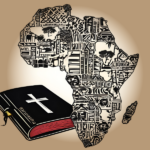As I watch the relentless genocide unfolding in Gaza—now in its 10th agonizing month—my heart aches with profound anguish and moral outrage.
The starkly divergent responses from the Southern Baptist Convention and the Baptist World Alliance reveal a troubling and widening divide within the Baptist community—a chasm that transcends theological debates and exposes a fundamental conflict of values and vision.
SBC values and vision
On one side, the SBC’s unwavering support for Israel, driven by Christian Zionism, sees the modern state of Israel as the fulfillment of biblical prophecy. This conviction is reflected in their resolutions, which firmly assert Israel’s right to self-defense, while often ignoring the severe suffering of Palestinians, including our Palestinian Christian brothers and sisters.
The 2016 resolution “On Prayer and Support for Israel” and the 2024 resolution “On Justice and Peace in the Aftermath of the October 7 Attack on Israel” exemplify this one-sided commitment to Israel’s security, neglecting the harsh realities faced by the Palestinian people under genocide, occupation and apartheid.
This stance risks perpetuating a relentless cycle of violence, drowning out the cries of children in Gaza and the pleas of beleaguered Christians in the West Bank and Jerusalem.
A compelling memory
I remember the stories shared by friends and colleagues who have witnessed the devastation firsthand—the cries of mothers in Gaza, the shattered dreams of young Palestinians and the silent suffering of Gazan Christians whose pain often is ignored in Western discourse.
One memory stands out—a young green-eyed Palestinian girl in a hospital in Gaza, her innocent face marred by fear, blood and tears. Her plight, and the countless like her, challenges me deeply, pushing me to confront the stark realities of our faith and our call to justice.
The Bible calls us to be peacemakers, to love our neighbors as ourselves and to stand against oppression. These calls compel us to act with urgency and compassion.
BWA values and vision
In contrast, the BWA offers a more nuanced and compassionate perspective.
Their 2015 resolution “Human Rights Violations in the Occupied Palestinian Territories” expressed profound concern over egregious abuses and called for a just peace that upholds the dignity and security of all individuals.
The 2024 resolution “On Peace and Justice in the Middle East” advocates for meaningful dialogue, respect for human rights and a viable two-state solution, emphasizing the fundamental humanity and rights of everyone affected.
This approach resonates deeply with the biblical call for righteousness and reconciliation, echoing Amos 5:24—“Let righteousness roll on like a river, and reconciliation like a never-failing stream”—and the teachings of Jesus to “sell your possessions and give to the poor” (Matthew 19:21).
Our Christian commitment
As a lifelong Christian, I am profoundly troubled by the moral abyss that has opened up between these two perspectives. Can we, in good conscience, continue to offer unwavering support for Israel while turning a blind eye to the oppression and injustices faced by the Palestinian people?
The ramifications of these differing positions extend far beyond theological debate. They impact real lives and futures, perpetuating cycles of violence and despair.
I recall meeting Gazan children with cancer in the West Bank—children suffering alone in the West Bank while their families survive the genocide in Gaza, their innocent eyes reflecting both the pain and desperation of their situation and the hope for a better future. Their stories are etched in my memory, a constant reminder of the urgent need for justice and peace.
Our commitment to Christ’s teachings calls us to transcend rigid theological and political stances. The church’s prophetic voice and its call for social justice urge us to confront these moral issues with empathy, courage and a thirst for true righteousness.
Jesus’ instructions to “give to everyone who asks you” (Luke 6:30) and Paul’s to “bear one another’s burdens” (Galatians 6:2) challenge us to pursue reconciliation rather than merely perpetuating conflict.
We are tasked with forging a future where both Palestinians and Israelis can live with respect, dignity, equality and their fundamental rights upheld.
More than reconciliation
This endeavor demands more than mere reconciliation. It requires a transformative vision for the global Baptist witness. We must align our theological convictions with the urgent humanitarian needs of the Palestinian people, especially in Gaza.
How can we support Israel without forsaking righteousness and reconciliation for all of God’s children? What concrete steps can we take to move beyond entrenched positions and work toward a future where the respect and dignity of both Palestinians and Israelis are upheld? These are not abstract questions but urgent challenges that will shape our legacy and impact the world.
As we stand at the crossroads of this moral and ethical crisis, let us heed the words of the prophet Amos and strive to be instruments of God’s restorative justice. Let us bind up the wounds of a broken world and lead the way toward a future where the promise of the Beatitudes—“blessed are the peacemakers”—is realized in all its glory.
I urge you, my brothers and sisters in Christ, to act. Let us pray fervently for peace, speak boldly for justice and act compassionately for reconciliation. Support organizations that provide aid to those affected, advocate for policies that promote human rights and engage in dialogue that fosters understanding.
Together, let us embody the true teachings of Christ, advocating for reconciliation over conflict, righteousness over oppression and love over hatred. In doing so, we reaffirm our commitment to a compassionate and unified global Baptist community, one that stands as a lighthouse of hope and healing in a world desperately in need.
Jack Nassar is a Palestinian Christian based in Ramallah. He holds a Master of Arts degree in political communications from Goldsmiths University in London and possesses expertise across sectors, driving positive change. The views expressed in this opinion article are those of the author.















We seek to connect God’s story and God’s people around the world. To learn more about God’s story, click here.
Send comments and feedback to Eric Black, our editor. For comments to be published, please specify “letter to the editor.” Maximum length for publication is 300 words.